外研版(2019)必修第三册Unit 1 Knowing me, Knowing you Gramma & Vocabulary 课件(共22张PPT)
文档属性
| 名称 | 外研版(2019)必修第三册Unit 1 Knowing me, Knowing you Gramma & Vocabulary 课件(共22张PPT) | 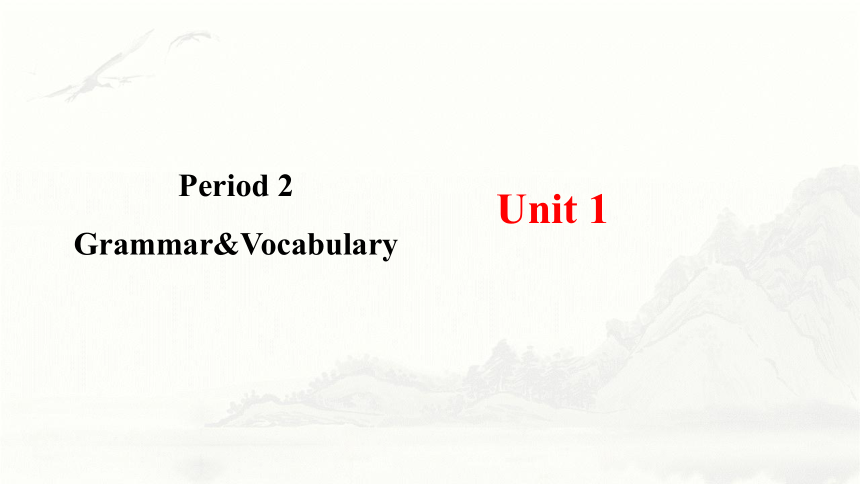 | |
| 格式 | pptx | ||
| 文件大小 | 953.6KB | ||
| 资源类型 | 教案 | ||
| 版本资源 | 外研版(2019) | ||
| 科目 | 英语 | ||
| 更新时间 | 2024-01-14 22:30:24 | ||
图片预览

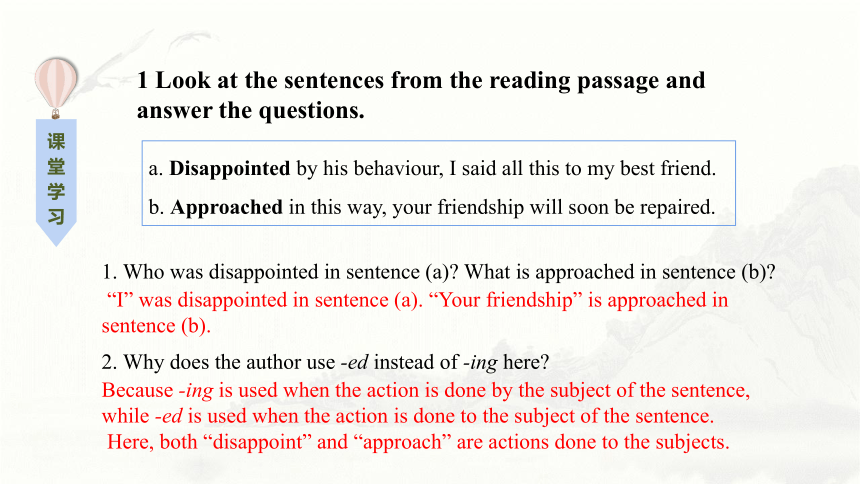
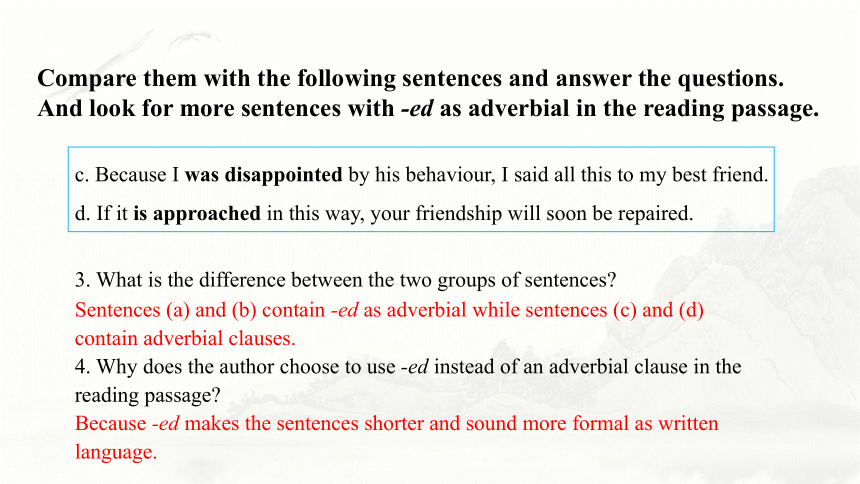
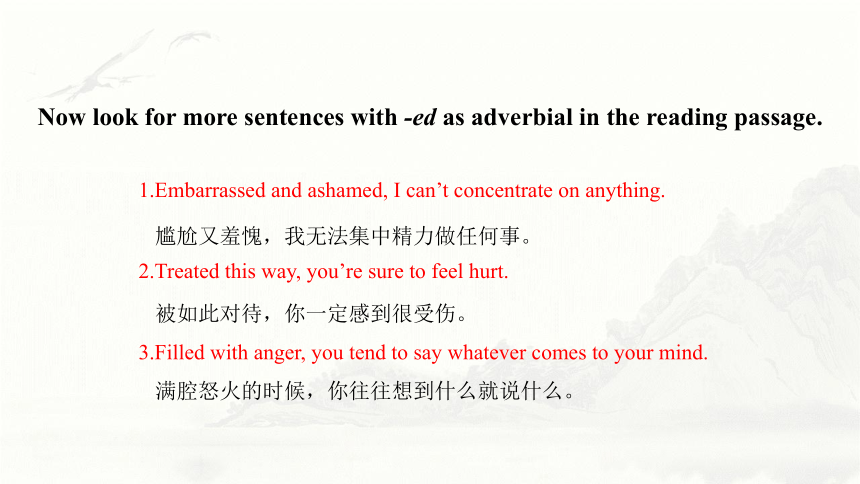
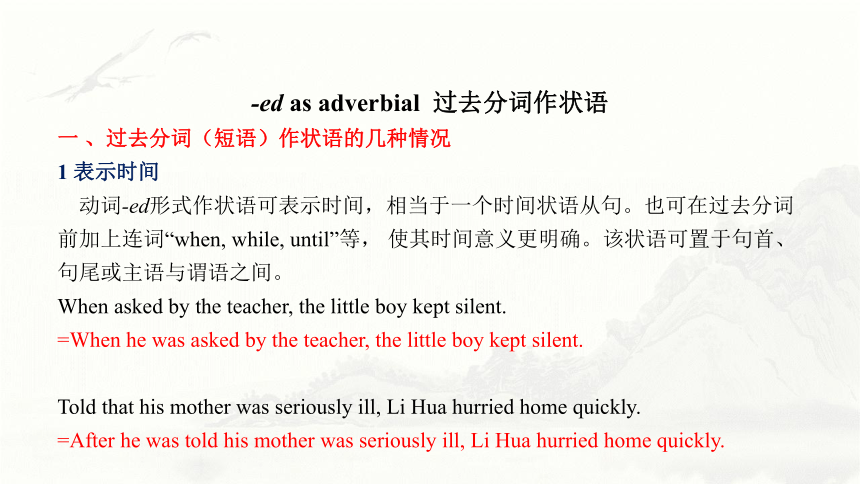
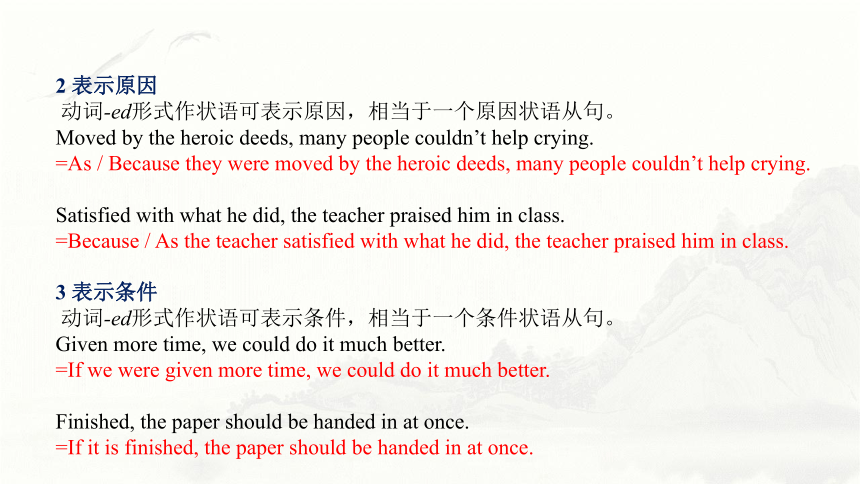
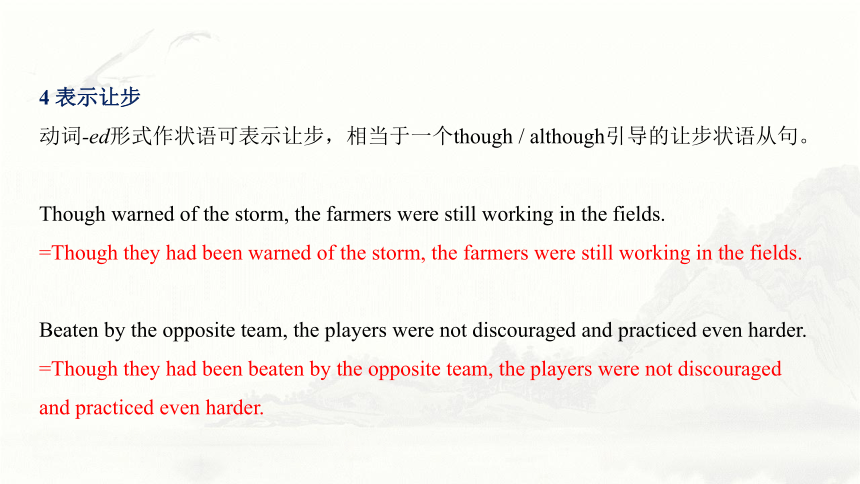
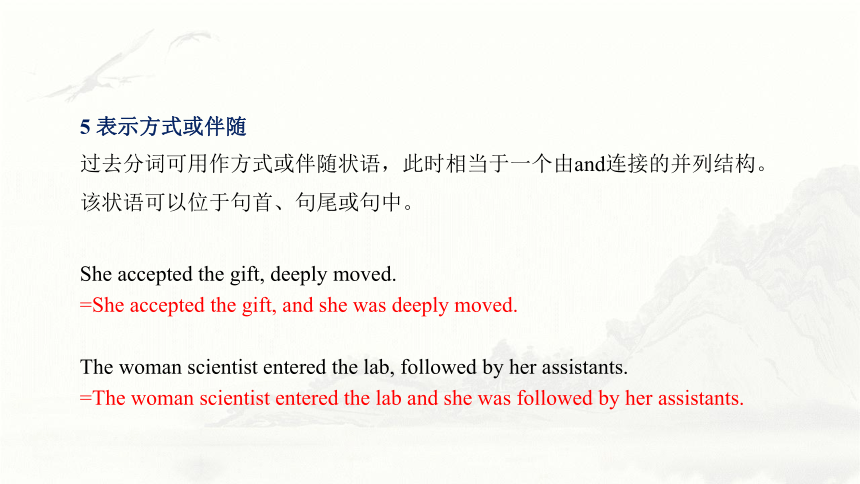
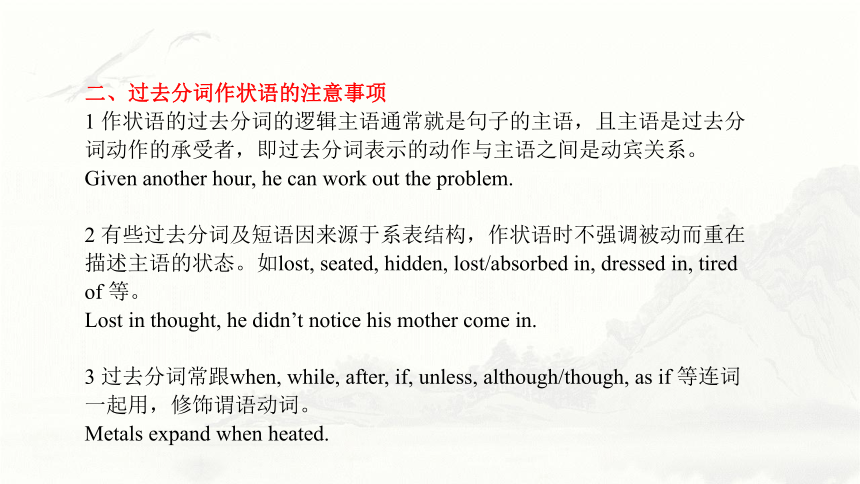
文档简介
(共22张PPT)
Unit 1
Period 2
Grammar&Vocabulary
课 堂 学 习
1 Look at the sentences from the reading passage and answer the questions.
a. Disappointed by his behaviour, I said all this to my best friend.
b. Approached in this way, your friendship will soon be repaired.
1. Who was disappointed in sentence (a) What is approached in sentence (b)
“I” was disappointed in sentence (a). “Your friendship” is approached in sentence (b).
2. Why does the author use -ed instead of -ing here
Because -ing is used when the action is done by the subject of the sentence, while -ed is used when the action is done to the subject of the sentence.
Here, both “disappoint” and “approach” are actions done to the subjects.
Compare them with the following sentences and answer the questions. And look for more sentences with -ed as adverbial in the reading passage.
c. Because I was disappointed by his behaviour, I said all this to my best friend.
d. If it is approached in this way, your friendship will soon be repaired.
3. What is the difference between the two groups of sentences
Sentences (a) and (b) contain -ed as adverbial while sentences (c) and (d) contain adverbial clauses.
4. Why does the author choose to use -ed instead of an adverbial clause in the reading passage
Because -ed makes the sentences shorter and sound more formal as written language.
尴尬又羞愧,我无法集中精力做任何事。
被如此对待,你一定感到很受伤。
满腔怒火的时候,你往往想到什么就说什么。
Now look for more sentences with -ed as adverbial in the reading passage.
1.Embarrassed and ashamed, I can’t concentrate on anything.
3.Filled with anger, you tend to say whatever comes to your mind.
2.Treated this way, you’re sure to feel hurt.
-ed as adverbial 过去分词作状语
一 、过去分词(短语)作状语的几种情况
1 表示时间
动词-ed形式作状语可表示时间,相当于一个时间状语从句。也可在过去分词前加上连词“when, while, until”等, 使其时间意义更明确。该状语可置于句首、句尾或主语与谓语之间。
When asked by the teacher, the little boy kept silent.
=When he was asked by the teacher, the little boy kept silent.
Told that his mother was seriously ill, Li Hua hurried home quickly.
=After he was told his mother was seriously ill, Li Hua hurried home quickly.
2 表示原因
动词-ed形式作状语可表示原因,相当于一个原因状语从句。
Moved by the heroic deeds, many people couldn’t help crying.
=As / Because they were moved by the heroic deeds, many people couldn’t help crying.
Satisfied with what he did, the teacher praised him in class.
=Because / As the teacher satisfied with what he did, the teacher praised him in class.
3 表示条件
动词-ed形式作状语可表示条件,相当于一个条件状语从句。
Given more time, we could do it much better.
=If we were given more time, we could do it much better.
Finished, the paper should be handed in at once.
=If it is finished, the paper should be handed in at once.
4 表示让步
动词-ed形式作状语可表示让步,相当于一个though / although引导的让步状语从句。
Though warned of the storm, the farmers were still working in the fields.
=Though they had been warned of the storm, the farmers were still working in the fields.
Beaten by the opposite team, the players were not discouraged and practiced even harder.
=Though they had been beaten by the opposite team, the players were not discouraged and practiced even harder.
5 表示方式或伴随
过去分词可用作方式或伴随状语,此时相当于一个由and连接的并列结构。该状语可以位于句首、句尾或句中。
She accepted the gift, deeply moved.
=She accepted the gift, and she was deeply moved.
The woman scientist entered the lab, followed by her assistants.
=The woman scientist entered the lab and she was followed by her assistants.
二、过去分词作状语的注意事项
1 作状语的过去分词的逻辑主语通常就是句子的主语,且主语是过去分词动作的承受者,即过去分词表示的动作与主语之间是动宾关系。
Given another hour, he can work out the problem.
2 有些过去分词及短语因来源于系表结构,作状语时不强调被动而重在描述主语的状态。如lost, seated, hidden, lost/absorbed in, dressed in, tired of 等。
Lost in thought, he didn’t notice his mother come in.
3 过去分词常跟when, while, after, if, unless, although/though, as if 等连词一起用,修饰谓语动词。
Metals expand when heated.
三、过去分词与现在分词作状语的区别
1 过去分词作状语时,通常与其逻辑主语之间存在逻辑上的动宾关系, 即被动关系;现在分词作状语时,通常与其逻辑主语之间存在逻辑上的主谓关系, 即主动关系。
2 过去分词作状语时,分词的逻辑主语与句子的主语要一致。否则,须加上自己的逻辑主语,构成独立主格结构。
Once seen, the beauty of the scenery here will leave a deep impression on you.
Seeing the beauty of the scenery here, we were impressed by it.
The dog locked in the room, we dared to move.
Practice:
1._________(see) from the top of the hill, the school looks like a big garden.
2.______ (give) more attention, the accident could have been avoided.
3.__________(criticise) by the teacher, the girl was very upset.
4._______(leave) alone at home, Jenny didn’t feel afraid at all.
5.__________(follow) by his students, the teacher went into the lab.
6.When________(give) a physical examination, you should keep calm.
7.He stood there silently, ________ (move) to tears.
Seen
Given
Criticised
Left
Followed
given
moved
用括号内所给词的适当形式填空
2 Rewrite the underlined sentences with the -ed form.
Last week, Anne was attracted by a particular article in a magazine, so she bought it. Three days ago, to complete her homework quickly, she copied part of the article without thinking. Her teacher was very satisfied with her homework. Anne was praised in class, and she felt happy as well as ashamed. Then, the teacher wanted to enter her homework into a writing competition. Anne was shocked by the decision and did not know what to do. If she told the truth, the whole class would find out. They would look down on her. If she kept silent, maybe no one would ever find out...
What should Anne do
Last week, attracted by a particular article in a magazine, Anne bought it.
Praised in class, Anne felt happy as well as ashamed.
Shocked by the decision, Anne did not know what to do.
3 Read the plot summary and choose the correct form of the words.
Inside Out is an animated film about the five emotions of a girl called Riley: Joy, Sadness, Fear, Disgust and Anger. Influencing / Influenced mainly by Joy, most of Riley’s memories are happy ones.
Believing / Believed that she is Riley’s most important emotion, Joy always tries to take the lead. Preventing/ Prevented from playing her role in Riley’s emotional development, Sadness feels annoyed. When Riley moves to a new city,
she has a hard time adjusting to her new surroundings. Sadness wants to do her duty but by accident causes the loss of Riley’s happy core memories with Joy. Now separating / separated from her friends and her beloved hockey team, Riley starts to feel lost and helpless, and wants to run away from her parents and new school. Worried about her, Joy and Sadness try to work together to ensure she gets her core memories back.
Eventually, realising / realised that every emotion has a role, Joy understands it is okay for Riley to feel sad sometimes. Accepting sadness as part of life helps Riley deal with the emotional complexity of growing up, and settle down in her new life.
4 Read the tips and underline the words that describe behaviour towards others.
Interpersonal relationships
1 forgive; apologise
2 criticise
3 lie
4 judge
5 complain
Some other tips
1) It’s a good idea to be generous with others. This can help create a lasting friendship.
2) Try to communicate openly with your friends. Don’t always keep things to yourself
3) It’s important to laugh. Smiling and laughing will make you and others feel better.
5 Describe the situations with the words you underlined in Activity 4.
I’m really sorry. I didn’t mean it._____________
You’re so selfish._____________
I know you’re sorry. It’s OK. Don’t worry about it._________
I can tell he is not easy to get along with._____________
I don’t want to wait for him all the time._____________
My pet parrot flew away with my homework._________
apologise
criticise
forgive
judge
complain
lie
6 Work in pairs. Discuss what you should do in the following situations and explain your reasons.
Situation 1: You forgot your best friend’s birthday, and you feel bad about it.
I will apologise to my friend sincerely and state my reasons honestly.
My reason maybe:
I am really sorry to tell you that I didn’t go to celebrate your birthday personally and missed a wonderful chance to enjoy myself with you. Last week, our school held an important English speech contest. I was so busy writing a draft and practising speech that I forgot your birthday. Now I hope you could understand and forgive me.
Situation 2: Your neighbour always makes lots of noise late at night. You cannot stand it.
I will try to communicate openly with my neighbour.
I go to bed at around 10 o’clock. But the noise my neighbour made at night really bother me. I hope my neighbour can pay a little bit attention to that.
My reason maybe:
Situation 3: Your classmate borrowed a book from you and lost it.
It is a good idea to be generous with others. This can help create a lasting friendship. So I won’t mind it.
It doesn’t matter. You don’t have to feel bad about it. I have read it through. I just sent the book to you as a gift.
My reason maybe:
Situation 4: Your friends have asked you to watch a boxing match with them, but you don’t like boxing.
Appreciate others’ good will. It is important to tell the truth. I will saying no to my friends politely.
Thank you for your invitation. But I am not quite interested in it. I hope maybe next time we can do something else together.
My reason maybe:
1. Retell the usages of -ed as adverbial.
2. List some words that describe behaviour towards others.
Unit 1
Period 2
Grammar&Vocabulary
课 堂 学 习
1 Look at the sentences from the reading passage and answer the questions.
a. Disappointed by his behaviour, I said all this to my best friend.
b. Approached in this way, your friendship will soon be repaired.
1. Who was disappointed in sentence (a) What is approached in sentence (b)
“I” was disappointed in sentence (a). “Your friendship” is approached in sentence (b).
2. Why does the author use -ed instead of -ing here
Because -ing is used when the action is done by the subject of the sentence, while -ed is used when the action is done to the subject of the sentence.
Here, both “disappoint” and “approach” are actions done to the subjects.
Compare them with the following sentences and answer the questions. And look for more sentences with -ed as adverbial in the reading passage.
c. Because I was disappointed by his behaviour, I said all this to my best friend.
d. If it is approached in this way, your friendship will soon be repaired.
3. What is the difference between the two groups of sentences
Sentences (a) and (b) contain -ed as adverbial while sentences (c) and (d) contain adverbial clauses.
4. Why does the author choose to use -ed instead of an adverbial clause in the reading passage
Because -ed makes the sentences shorter and sound more formal as written language.
尴尬又羞愧,我无法集中精力做任何事。
被如此对待,你一定感到很受伤。
满腔怒火的时候,你往往想到什么就说什么。
Now look for more sentences with -ed as adverbial in the reading passage.
1.Embarrassed and ashamed, I can’t concentrate on anything.
3.Filled with anger, you tend to say whatever comes to your mind.
2.Treated this way, you’re sure to feel hurt.
-ed as adverbial 过去分词作状语
一 、过去分词(短语)作状语的几种情况
1 表示时间
动词-ed形式作状语可表示时间,相当于一个时间状语从句。也可在过去分词前加上连词“when, while, until”等, 使其时间意义更明确。该状语可置于句首、句尾或主语与谓语之间。
When asked by the teacher, the little boy kept silent.
=When he was asked by the teacher, the little boy kept silent.
Told that his mother was seriously ill, Li Hua hurried home quickly.
=After he was told his mother was seriously ill, Li Hua hurried home quickly.
2 表示原因
动词-ed形式作状语可表示原因,相当于一个原因状语从句。
Moved by the heroic deeds, many people couldn’t help crying.
=As / Because they were moved by the heroic deeds, many people couldn’t help crying.
Satisfied with what he did, the teacher praised him in class.
=Because / As the teacher satisfied with what he did, the teacher praised him in class.
3 表示条件
动词-ed形式作状语可表示条件,相当于一个条件状语从句。
Given more time, we could do it much better.
=If we were given more time, we could do it much better.
Finished, the paper should be handed in at once.
=If it is finished, the paper should be handed in at once.
4 表示让步
动词-ed形式作状语可表示让步,相当于一个though / although引导的让步状语从句。
Though warned of the storm, the farmers were still working in the fields.
=Though they had been warned of the storm, the farmers were still working in the fields.
Beaten by the opposite team, the players were not discouraged and practiced even harder.
=Though they had been beaten by the opposite team, the players were not discouraged and practiced even harder.
5 表示方式或伴随
过去分词可用作方式或伴随状语,此时相当于一个由and连接的并列结构。该状语可以位于句首、句尾或句中。
She accepted the gift, deeply moved.
=She accepted the gift, and she was deeply moved.
The woman scientist entered the lab, followed by her assistants.
=The woman scientist entered the lab and she was followed by her assistants.
二、过去分词作状语的注意事项
1 作状语的过去分词的逻辑主语通常就是句子的主语,且主语是过去分词动作的承受者,即过去分词表示的动作与主语之间是动宾关系。
Given another hour, he can work out the problem.
2 有些过去分词及短语因来源于系表结构,作状语时不强调被动而重在描述主语的状态。如lost, seated, hidden, lost/absorbed in, dressed in, tired of 等。
Lost in thought, he didn’t notice his mother come in.
3 过去分词常跟when, while, after, if, unless, although/though, as if 等连词一起用,修饰谓语动词。
Metals expand when heated.
三、过去分词与现在分词作状语的区别
1 过去分词作状语时,通常与其逻辑主语之间存在逻辑上的动宾关系, 即被动关系;现在分词作状语时,通常与其逻辑主语之间存在逻辑上的主谓关系, 即主动关系。
2 过去分词作状语时,分词的逻辑主语与句子的主语要一致。否则,须加上自己的逻辑主语,构成独立主格结构。
Once seen, the beauty of the scenery here will leave a deep impression on you.
Seeing the beauty of the scenery here, we were impressed by it.
The dog locked in the room, we dared to move.
Practice:
1._________(see) from the top of the hill, the school looks like a big garden.
2.______ (give) more attention, the accident could have been avoided.
3.__________(criticise) by the teacher, the girl was very upset.
4._______(leave) alone at home, Jenny didn’t feel afraid at all.
5.__________(follow) by his students, the teacher went into the lab.
6.When________(give) a physical examination, you should keep calm.
7.He stood there silently, ________ (move) to tears.
Seen
Given
Criticised
Left
Followed
given
moved
用括号内所给词的适当形式填空
2 Rewrite the underlined sentences with the -ed form.
Last week, Anne was attracted by a particular article in a magazine, so she bought it. Three days ago, to complete her homework quickly, she copied part of the article without thinking. Her teacher was very satisfied with her homework. Anne was praised in class, and she felt happy as well as ashamed. Then, the teacher wanted to enter her homework into a writing competition. Anne was shocked by the decision and did not know what to do. If she told the truth, the whole class would find out. They would look down on her. If she kept silent, maybe no one would ever find out...
What should Anne do
Last week, attracted by a particular article in a magazine, Anne bought it.
Praised in class, Anne felt happy as well as ashamed.
Shocked by the decision, Anne did not know what to do.
3 Read the plot summary and choose the correct form of the words.
Inside Out is an animated film about the five emotions of a girl called Riley: Joy, Sadness, Fear, Disgust and Anger. Influencing / Influenced mainly by Joy, most of Riley’s memories are happy ones.
Believing / Believed that she is Riley’s most important emotion, Joy always tries to take the lead. Preventing/ Prevented from playing her role in Riley’s emotional development, Sadness feels annoyed. When Riley moves to a new city,
she has a hard time adjusting to her new surroundings. Sadness wants to do her duty but by accident causes the loss of Riley’s happy core memories with Joy. Now separating / separated from her friends and her beloved hockey team, Riley starts to feel lost and helpless, and wants to run away from her parents and new school. Worried about her, Joy and Sadness try to work together to ensure she gets her core memories back.
Eventually, realising / realised that every emotion has a role, Joy understands it is okay for Riley to feel sad sometimes. Accepting sadness as part of life helps Riley deal with the emotional complexity of growing up, and settle down in her new life.
4 Read the tips and underline the words that describe behaviour towards others.
Interpersonal relationships
1 forgive; apologise
2 criticise
3 lie
4 judge
5 complain
Some other tips
1) It’s a good idea to be generous with others. This can help create a lasting friendship.
2) Try to communicate openly with your friends. Don’t always keep things to yourself
3) It’s important to laugh. Smiling and laughing will make you and others feel better.
5 Describe the situations with the words you underlined in Activity 4.
I’m really sorry. I didn’t mean it._____________
You’re so selfish._____________
I know you’re sorry. It’s OK. Don’t worry about it._________
I can tell he is not easy to get along with._____________
I don’t want to wait for him all the time._____________
My pet parrot flew away with my homework._________
apologise
criticise
forgive
judge
complain
lie
6 Work in pairs. Discuss what you should do in the following situations and explain your reasons.
Situation 1: You forgot your best friend’s birthday, and you feel bad about it.
I will apologise to my friend sincerely and state my reasons honestly.
My reason maybe:
I am really sorry to tell you that I didn’t go to celebrate your birthday personally and missed a wonderful chance to enjoy myself with you. Last week, our school held an important English speech contest. I was so busy writing a draft and practising speech that I forgot your birthday. Now I hope you could understand and forgive me.
Situation 2: Your neighbour always makes lots of noise late at night. You cannot stand it.
I will try to communicate openly with my neighbour.
I go to bed at around 10 o’clock. But the noise my neighbour made at night really bother me. I hope my neighbour can pay a little bit attention to that.
My reason maybe:
Situation 3: Your classmate borrowed a book from you and lost it.
It is a good idea to be generous with others. This can help create a lasting friendship. So I won’t mind it.
It doesn’t matter. You don’t have to feel bad about it. I have read it through. I just sent the book to you as a gift.
My reason maybe:
Situation 4: Your friends have asked you to watch a boxing match with them, but you don’t like boxing.
Appreciate others’ good will. It is important to tell the truth. I will saying no to my friends politely.
Thank you for your invitation. But I am not quite interested in it. I hope maybe next time we can do something else together.
My reason maybe:
1. Retell the usages of -ed as adverbial.
2. List some words that describe behaviour towards others.
